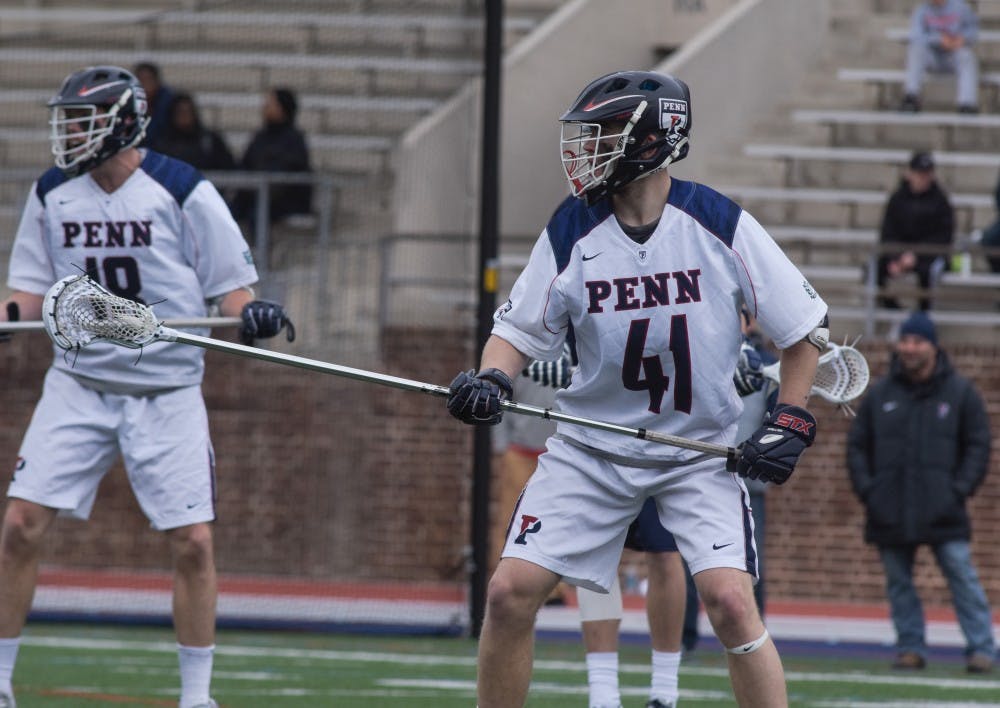
Though junior long-stick midfielder Connor Keating battled valiantly on both sides of the ball, Penn men's lacrosse came up just short of upsetting first-place Yale in a tough 14-12 loss.
Credit: Pranay VemulamadaSometimes it’s not all about how you finish.
Penn men’s lacrosse is proof of that, losing to No. 19 Yale, 14-12, despite scoring six goals in the game’s final eight minutes.
The Quakers (4-4, 1-2 Ivy) battled the Bulldogs (5-3, 3-0) all game long, trailing by only a goal with five minutes to play in the third quarter. Unfortunately for the Red and Blue, the reigning Ivy League Champions answered a JJ McBride goal with a six-goal run, ballooning the lead from 7-6 to 13-6 and effectively putting the game out of reach... or so one would think.
Proving that lacrosse is indeed a game of runs, the Quakers stormed back, sparked by unlikely contributors. Standout defensive midfielder Austin Kreinz showcased his two-way ability, burying an outside shot to cut the lead to six. His goal was followed minutes later by a tally from senior midfielder Chris Hillburn, who, like Kreinz, had only scored once prior to this game.
Next, a usual suspect got involved, as Connor Keating unleashed his second transition rip of the game to dwindle Yale’s lead to four.
However, the run appeared over as Yale’s superstar attackman, Ben Reeves, buried his fifth of the game to put Yale comfortably in front, up by five once again.
But the Quakers didn’t quit, scoring three goals in 38 seconds to send the crowd into a frenzy. The first two came from Reilly Hupfeldt, who demonstrated great awareness on the crease, making timely cuts and finishing quickly. The next one was scored by Tyler Dunn on a lefty step-down shot to the top corner of the goal. With 1:07 left to play, Penn was suddenly only down by two.
Sadly for the Quakers, that is as close as they would get. Despite possessing the ball throughout the final minute of play, the Red and Blue were unable to find the back of the net, ending an incredible run rather abruptly.
As coach Mike Murphy so succinctly put it, “It was too little, too late.”
In most games, scoring six of the game’s final seven goals should culminate in a win, but a series of difficulties in specific areas haunted the Quakers throughout and handicapped them so severely that a win was almost an impossibility.
Just as a lacrosse game literally starts at the faceoff “X,” it metaphorically starts there as well. In order to win the game, it is paramount that a team win the possession battle, and faceoffs are the primary way in which a team can earn possession.
Winning only 13 of 30 faceoffs immediately put the Quakers at a distinct disadvantage, forcing them to scrap for every possession.
Additionally, there was a direct correlation between faceoff wins and goals for Yale. Breaking the game down into quarters, Yale outscored Penn in the first and third periods only. By no coincidence, those were the two quarters in which Yale dominated faceoffs, winning 10 out of 14 draws. The second and fourth quarters belonged to the Red and Blue, as they outscored Yale in each. Unsurprisingly, these were the two quarters in which Penn won the majority of the faceoffs, grabbing nine of 16.
Beyond faceoffs, an even larger problem looms for Penn. Goalie play, a strength as recently as the beginning of this season, has become an extreme weakness.
Former Ivy League Rookie of the Year Reed Junkin began the day in net but allowed six first-half goals to only two saves. Sensing that his goalie wasn’t seeing the ball well, coach Murphy made the switch, allowing freshman Alex DeMarco to play the second half. However, the younger keeper wasn’t any more effective, conceding eight goals while also only stopping two shots.
The combined .222 save percentage of the two goalies was absolutely crippling, preventing any chance of a win.
If Junkin is unable to return to form, it’s fair to question whether this team has any chance of reaching the heights to which it aspires. His recent failings have become too important to ignore and too obvious to hide. The Quakers need him playing at his peak for them to have any chance to win the Ivy League.
“Certainly we know Reed has the ability to be a very, very good college goalie,” coach Murphy said. “He was the Second Team All-Ivy goalie last year, and he was at almost 70 [save percentage] through the first two games. We just have to go back and look at the film to address the fundamentals to get him back to where he was at the beginning of the year and last year.”
Despite the loss, this game offered enough positives to suggest that, if Junkin can regain his form and if the faceoff-play can improve only slightly, Penn has a legitimate chance to win the league.
The Penn offense, stagnant as of late, came alive today in way it hasn’t since the Penn State game, scoring goals quickly and efficiently. Leading that charge was junior attackman/midfielder Kevin McGeary who was consistently able to get his hands free on his way to a hat trick. Also contributing three goals was Hupfeldt, while sophomore attackman Simon Mathias operated in a feeding roll, dishing out an assist for each of Hupfeldt’s goals.
The Quakers will need this explosive and diverse offensive display to become the norm in order to reach and win the Ivy League Tournament, but it may not even matter unless goalie and faceoff play are fixed, and fixed quickly.
The Daily Pennsylvanian is an independent, student-run newspaper. Please consider making a donation to support the coverage that shapes the University. Your generosity ensures a future of strong journalism at Penn.
Donate



